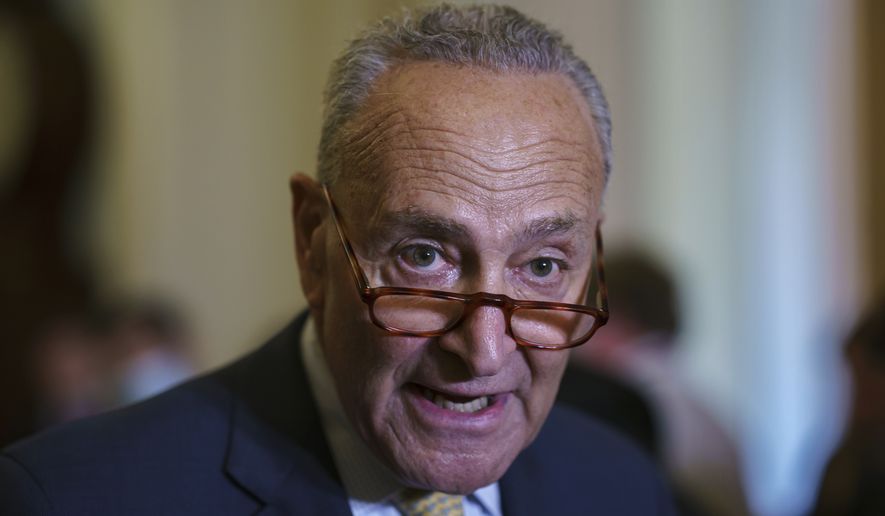The bipartisan group of senators behind the nascent $1.2 trillion infrastructure package inched towards an agreement Wednesday but a final deal is by no means in sight.
Lawmakers involved in the negotiations worked late into the evening on Tuesday trying to fashion a deal before Congress departs for a month-long break that’s supposed to start next week.
“We’re getting close and I’m hopeful we can get this done soon,” said Senate Majority Leader Charles E. Schumer, New York Democrat. “We’re not there yet, but we’re making progress. The number of issues has been narrowed significantly.”
At the same time, he threw up a potential new roadblock by making climate-change measures a prerequisite for a deal.
“As Majority Leader, I have made it clear that I will not pass an infrastructure package that does not reduce carbon pollution at a scale commensurate with the climate crisis we face,” Mr. Schumer said at a press conference.
Two of the top Senate negotiators, Republican Rob Portman of Ohio and Democrat Kyrsten Sinema, met with the White House as part of the ongoing talks.
Ms. Sinema met Tuesday with President Biden to discuss strategy for how to pass the package. After the meeting, Mr. Biden signaled he would take a more hands-on role in forging an agreement.
“With the Bipartisan Infrastructure Framework, we won’t just fix our crumbling infrastructure of today, we’re going to build for tomorrow,” Mr. Biden said on social media shortly after the meeting. “And we’re going to create good-paying, union jobs in the process.”
Later that evening, the White House dispatched Steve Richetti, a senior adviser to the president who is taking the lead on infrastructure, to meet with Mr. Portman at the Capitol. The two discussed finite details of the package in a closed-door meeting that lasted for several hours.
The negotiations are bogged down, in part, by how to pay for new upgrades to the nation’s roads and bridges without raising taxes.
The senators working to fashion the deal have proposed that more than $570 billion of the $1.2 trillion come from new revenue. The other $630 billion is to be repurposed from funds already authorized for coronavirus relief.
Finding new revenue sources, however, has been difficult.
SEE ALSO: Schumer warns infrastructure bill is null without climate legislation
Similarly, major fissures have erupted over transit and water infrastructure. Democrats want to boost spending for both in exchange for signing onto the deal.
Sen. Mitt Romney, a Utah Republican involved in the talks, said a compromise had been fashioned on the topic of water infrastructure. According to Mr. Romney, the final deal will include $15 billion to remove lead pipes from water systems in targeted areas.
Democrats and the White House, however, have been pushing for at least $45 billion to replace all existing lead pipes across the entire country.
It is unclear if that will be enough to pacify some Democrats.
Senate Environment and Public Works Committee chairman Tom Carper, for instance, has pledged to oppose the package unless it includes money authorizing a water and sanitation bill that passed the Senate this year.
“The expectation all along was that our bill would be funded, fully funded, and it hasn’t yet,” said Mr. Carper, Delaware Democrat. “We’ve been fighting to make sure that what I thought was a smart policy, really smart policy … don’t want to see us walk away from that, so we’re going to get as close to that as we can.”
Another dispute is over transit funding. Democrats are seeking to boost funding for public transportation systems, like Amtrak, over roads and highways.
Republicans are threatening to oppose the overall deal over such increases.
GOP lawmakers point to the nearly $70 billion in emergency assistance that was doled out to public transit during the height of the coronavirus pandemic last year. Much of the money has yet to be spent, while ridership is nowhere near its pre-pandemic levels.
Even if such divisions can be reconciled, it remains to be seen if the overall deal will garner sufficient support from at least 10 Republicans to overcome a likely filibuster in the evenly split Senate.
• Mica Soellner contributed to this report.
• Haris Alic can be reached at halic@washingtontimes.com.




Please read our comment policy before commenting.